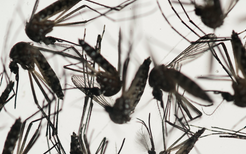BRASILIA, Brazil -- Brazil's government has authorized hundreds of millions of dollars to slow the spread of transmissible diseases like Zika -- with $230 million made available to states in the past two years alone. But auditors have discovered that a lot of that money has either been misused by state authorities or not spent.
The global Zika outbreak has struck Brazil harder than any other country, with 100,000 confirmed cases and many more suspected, according to the World Health Organization. Zika can trigger microcephaly, a condition in which babies are born with small heads and severe brain defects.
The reasons for the failure to combat such diseases vary from mismanagement to cumbersome laws that limit states' ability to use the federal money for capital investments and long-term projects. For instance, states can easily buy insecticide, but not the machines or vehicles needed to spray them, officials say.
But another factor is at work. Zika's explosive arrival coincided with heightened scrutiny of government spending in the wake of a multibillion-dollar kickback scheme involving the state oil company. The crackdown has prompted some state officials to be extremely cautious about using federal funds -- or not use them at all.
More than half of Brazil's 27 states left millions of dollars in federal "sanitary vigilance" funds sitting in banks in the past two years, according to government audits made public in September.
"It's gotten to the point where nobody wants to touch federal resources," said Joao Francalino, planning director of the western state of Acre's health agency. His state left 53 percent of the $3.3 million of "sanitary vigilance" funds in its account untouched. "Everyone is afraid they will end up being sued or investigated."
Brazil's Transparency Ministry has nearly doubled its investigations into the use of federal funds by states and municipalities compared with 2014. The steep increase in inspections comes as Brazil has been shaken by the scandal linked to the oil company Petrobras, which has led to the arrests of dozens of politicians and business executives since March 2014. The ministry says that scandal didn't directly lead to its stepped-up enforcement actions, but that it did strengthen the public's demand for accountability.
In the first several months of 2016, the ministry sent dozens of auditors to review state use of federal money in the fight against the Aedes aegypti mosquito, which transmits Zika as well as better-known viruses that cause dengue and chikungunya.
In many states, these visits marked the first time that health agencies had been audited in nearly 10 years, according to the Transparency Ministry's records.
What the auditors found shocked them. In nearly a dozen states, they discovered overflowing or expired stocks of insecticide in warehouses, according to government audits. In three Brazilian states, conditions were so horrid that the warehouses themselves had become breeding grounds for mosquitoes, increasing residents' chances of getting Zika, the reports show.
Georgea Celane, a 34-year-old auditor from northern Brazil, was ordered in March to inspect a warehouse in Amapa state that stored insecticide to fight the Aedes aegypti mosquito, which transmits Zika. When Celane opened the door of the warehouse, a flock of bats flew out and she discovered more than 100 boxes of expired insecticide, covered in mold and animal feces.
"I took some photos and had to get out to breathe," she said. She also found new and expired boxes of insecticide stored together with no clear identification. Both were covered with mold and animal feces.
Amapa's health department said in a statement that it could not renovate the warehouse because it was on loan from the federal government, and that state authorities were preparing another location for the insecticide. It denied that the newer boxes of insecticide were mingled with expired chemicals.
The Zika epidemic first emerged in 2015, when Brazilian authorities reported an unprecedented outbreak of microcephaly cases. Months later, scientists confirmed that pregnant women who were bitten by mosquitoes carrying the virus had an elevated risk of bearing babies with serious neurological damage. Brazil's government rushed experts and insecticide to affected areas and mobilized hundreds of thousands of soldiers to spread awareness about the Aedes aegypti mosquito.
Although infection rates in Brazil have dropped in recent months thanks to colder weather, the looming Brazilian summer is expected to cause another wave of cases.
State officials say they want to do everything they can to prevent Zika but are hamstrung by regulations that limit their ability to act quickly and creatively.
"If you follow the budget rules to a T, you end up freezing health decisions you need to make. It's a constant battle trying to reconcile the urgency one faces in health agencies with following the law," said Nelson Tavares, the health secretary of the state of Mato Grosso do Sul.
A Section on 11/13/2016
